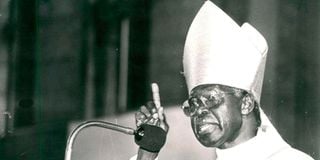Cardinal Otunga and the making of a saint

The late Maurice Cardinal Otunga.
What you need to know:
- The life story of Cardinal Otunga, authored by the Vice Postulator, was submitted to Rome recently.
- Cardinal Otunga was a leader and servant who embraced the theological virtues of faith, hope and love.
This year marks the 18th anniversary of the death of Maurice Cardinal Otunga, Emeritus Archbishop of Nairobi, who was given the title Servant of God by Rome in 2010. Since the last annual celebration of his departure, a number of developments have occurred.
Catholic faithful and people of goodwill were invited to pray for the progress of the process and specifically for an extraordinary miracle to be reported. In support of this effort, the Beatification Office in Nairobi intensified distribution of cards bearing his black-and-white photograph on one side and a prayer for his beatification on the other.
These prayer cards, printed in various languages including English and Swahili, have been approved by the Congregation for the Causes of Saints and John Cardinal Njue, the Petitioner of the Cause. The cards are given out free of charge as their production was paid for by donations. Uptake of the cards across the country is remarkable.
Unfortunately, fake prayer cards have surfaced in Nairobi and its environs. The fraudulent versions have several linguistic alterations in terrible English and have a backdrop of loud, shouting colours. The false prayer cards contain images of Jesus, Mary, angels, the Pope, the Servant of God and other prelates and clerics.
For each card, the profiteers are asking for a donation ostensibly to promote the cause and defray costs of publication. The faithful are urged not to fall prey to these fraudsters. The genuine cards are offered free of charge by the Beatification Office and are distributed through the Catholic parish network.
The making of a saint is a rigorous process. It is governed by two documents: the Teacher of Divine Perfection (Divinus Perfectionis Magister) issued by Pope John Paul II in 1983 and Mother of Saints (Sanctorum Mater) published by the Congregation for the Causes of Saints in 2007.
The first document outlines the stages of the road to sainthood. It also gives the congregation permission to formulate specific norms for conducting the process, including scrutinising the heroic virtues of candidates for sainthood and alleged miracles.
Rank and title of Venerable
While the earlier document, called an Apostolic Constitution, identifies and describes the four stages – Servant of God, Venerable, Blessed and Saint– the latter instruction focuses on the process as it ought to be conducted within a diocese or specific congregation before the cause enters the Roman phase.
The next stage for Cardinal Otunga will be his elevation to the rank and title of Venerable. It is the responsibility of the Postulator of this Cause to prepare a position paper – called the Positio – that argues for his heroic virtues. A Postulator must reside in Rome and presents a case in the cause for beatification and sainthood.
The position paper is based on the sworn evidence sourced from the dioceses and offices where the candidate for sainthood lived and worked. A Relator, one of the top officials in the Congregation for the Causes of Saints, directs the work of the Postulator.
A pivotal document for the compilation of the Positio is the official biography of the person on the road to sainthood. The life story of Cardinal Otunga, authored by the Vice Postulator, was submitted to Rome recently.
The said Congregation evaluates the position paper and members vote yes or no. For the candidate to be promoted to the rank of Venerable, the affirmative vote must be unanimous. But the final decision is made by the Holy Father.
Cardinal Otunga was a leader and servant who embraced the theological virtues of faith, hope and love. Many remember him as a practitioner and teacher of the cardinal virtues of prudence, justice, courage and temperance.
Nobody can recall any time the Servant of God allowed a politician to address the congregation in Church. If a politician wished to greet the faithful, this was permissible only outside the church building. For Cardinal Otunga, the liturgy is sacred and must not be interrupted or desecrated.
May the Servant of God continue interceding for Kenya and its people.
Sr. Esther W. Ichugu, FMI, is Administrator, Beatification Office Nairobi. Prof. (Fr) Lawrence Njoroge is Vice Postulator, Cause of Cardinal Otunga. [email protected]





